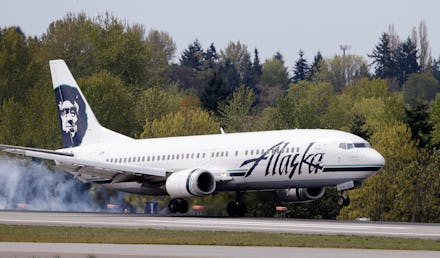Why do flights get overbooked? Airline experts explain what you can do to avoid being bumped.

Alaska Airlines recently made news when a gay couple was asked to give up one of their seats on a flight. In a Facebook post, David Cooley said that his partner was asked to move to accommodate a straight couple, in what seemed like “preferential treatment.”
In a statement to Gay Star News, the airline said it has apologized to the passengers, stating that both parties were assigned the same seats — a “seating error, compounded by a full flight and a crew seeking on-time departure and nothing more than that.”
According to Seth Kaplan, a managing partner at Airline Weekly, this issue may have been the result of both a system error and bad judgment, he said in a phone interview. However, William J. McGee, a journalist with a previous career in airline flight operations management, said this issue may be due to Alaska Airlines overbooking its seats, a common practice among airlines, he told Mic over the phone.
Why do flights get overbooked?
Overbooking is the result of miscalculation, McGee said. Typically, an airline anticipates a certain number of people missing their flight — and sometimes, they’re wrong.
“Airlines are allowed by law to sell more seats than they offer, and in theory, there’s nothing wrong with that,” he said. “But it’s a harmful practice that continues to inconvenience thousands of passengers every day.
“That’s when they have to figure out a way to make everybody happy,” Kaplan added. When an airline has oversold a flight, there are two consequences: voluntary or involuntary denied boarding. When a passenger is voluntarily bumped, they have chosen to take a later flight in exchange for compensation or vouchers. But without any volunteers, passengers can be involuntarily bumped and offered “denied boarding compensation,” which is based on ticket fare, length of delay caused by denial of boarding and whether the flight is domestic or international.
According to the U.S. Department of Transportation’s website, an airline may deny a seat subject to their own criteria, which can include a passenger’s check-in time, ticket price or frequent flyer status.
Not all airlines overbook flights, however. JetBlue has a policy against overbooking its flights, but Kaplan said it still has a surprisingly high rate of involuntary bumping. The airline recently attributed this to aircraft changes and occasionally bumping passengers from smaller planes while new planes undergo maintenance.
Major airlines, like United, Delta and American, however, have more complex prices and often change fares up until a flight takes off, resulting in a greater chance for miscalculation, McGee noted.
“They sell more seats than they have in this model,” he said. “In those cases, they’re charging different fares for practically every single seat on the plane and sometimes the system doesn’t work.”
Passengers have few rights with regard to involuntary bumping, McGee said. The U.S. Department of Transportation has very minimal rules in place and the rights of passengers are often determined on an airline’s website in an agreement called a “contract of carriage.”
“When you swipe a card and buy a seat, you’re agreeing to everything that’s in that contract that may be 70 pages long,” he said. “You don’t get to negotiate it. It’s a system that doesn’t favor consumers.”
“When you swipe a card and buy a seat, you’re agreeing to everything that’s in that contract that may be 70 pages long.”
Airplane seats are occupied more than they’ve ever been as a result of overbooked flights, McGee said. In 2018 so far, the average load factor for a flight is 81.7% worldwide, meaning just over 4 out of 5 seats on a flight are occupied, compared to that of 75.2% in 2005. “They’re trying to maximize profits.”
Kaplan added that airlines consider empty seats “spoilage” once a flight has taken off, as they can no longer sell them. “Like stale bread at a bakery at the end of the day,” he said.
Surprisingly, while flights are more packed than ever, people getting bumped has been at its lowest rate since 1995. McGee attributed this to the recent events surrounding an April 2017 United flight when passenger David Dao was dragged from his seat. McGee said airlines reacted by overbooking seats less frequently. In fact, between January and March of 2017, just prior to the incident, United involuntarily denied boarding to 900 passengers. Between those same calendar months in 2018, United denied just 27.
How to avoid getting bumped from a flight
For those who want to avoid being bumped, fortunately, there are a few things you can do — though they aren’t entirely fool-proof, McGee stressed. He recommends that passengers confirm a seat assignment ahead of time and check-in as early as possible to lessen the chances of being bumped.
“From the airlines’ perspective, they’re much more likely to bump someone who hasn’t checked in or shown up than they are to [bump] someone who’s sitting there and with a boarding pass in their hands,” he said.
Also, be on the lookout for a long stand-by line at a gate, which is also an indication that seats are in high demand and the importance of getting your seat assigned.
And when all else fails, volunteering to take a later flight has its advantages —according to the U.S. Department of Transportation website, passengers are free to negotiate with an airline. “United and Delta, among other airlines, have authorized their agents to go up to $10,000 if they have to,” Kaplan said. “And everybody has their price.”